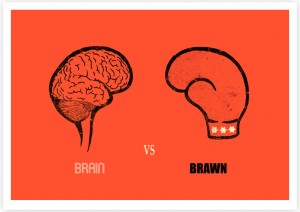If you’re familiar with the CBS television show Survivor, then you know that their most recent season divided the contestants into three teams: beauty, brains, and brawn. I think that this way of categorizing the people on the show (for this season) is interesting because it gives the impression that society believes a person can only be one thing (brains, beauty, or brawn). Anyone that can fit into all three of those categories is looked at as an exception. If someone were to tell you to envision a scientist, images of a person in a white lab coat and various other scientific materials would pop into your head. I can guarantee you that you would not picture a scientist as someone who lifts weights in his/her spare time. This is because mental strength is linked to physical weakness and vice versa. Because of these stereotypes, athletes get the reputation of being less intelligent, hence: the dumb jock persona.
I researched to see if there is any truth to this stereotype and came across a study conducted in 2002 and 2003 that took place at Washington State University. The scientists studied roughly 6,000 undergraduate students who enrolled between 2002 and 2003, (about one third of the 6,000 failed out and did not graduate). This is an observational study because the scientists did not change any variable that would have an affect on the students’ academic performance. The scientists tracked the performance of the students during their first semester of their freshman year, and then again once they graduated. After gathering the GPAs, the scientists looked at confounding variables that may have enabled the students to receive their diplomas. Confounding variables were: major, socio-economic status, gender, race, ethnicity, involvement on campus, and prior (high school) academic performance.
What the scientists found was interesting. The results showed that students that were in a science or engineering program were at least three times more likely to graduate in five or six years than students in other programs. They concluded that student athletes were more likely to graduate between five or six years in comparison to the non-athlete students. I think it’s also worth noting that the study also concluded that students that were members of a fraternity or sorority were, on average, three times more likely to graduate in five or six years compared to those not involved in Greek life. The scientists conducting the study also pointed out that race and ethnicity were not directly related to the achieving of a diploma. However, they said that socio-economic status as well as financial status contributed to the success or failure of a student and that ethnicity and race do have a relationship in this. One of the scientists made a statement saying that athletes were more likely to graduate on time because they needed to show academic success in order to keep their position on a team.
Certain programs (like science and engineering as well as Greek organizations) requires their students and members to uphold a certain GPA, otherwise they will fail out of the program or lose membership status. Similarly, athletes are aware that if they fall below a certain GPA, they could get replaced. If they cannot afford to attend a university without the money from a sports scholarship, then they lose their opportunity at education. I think this study demonstrates how membership, a degree, or a spot on a sports team boosts incentive to have a successful academic performance. Reverse causation can be ruled out because having good grades does not make you an athlete. These results, although don’t prove that every athlete has academic success, suggests that a majority, does. There isn’t a direct correlation between being an athlete and getting good grades, but there seems to be a strong relationship between the two with confounding variables further strengthening the correlation.




















